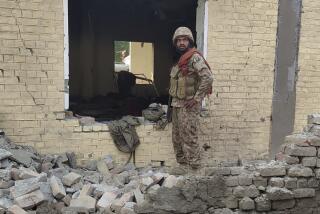17 killed in suicide attack in western Iraq
- Share via
Reporting from Ramadi, Iraq, and Baghdad — Suicide bombers killed at least 17 people at government headquarters in western Iraq’s Anbar province Monday, in the second attack in less than a month, security sources said.
A car bomb exploded at a checkpoint just yards from the main gate to the compound in Ramadi, the provincial capital. As people scrambled to help, a second bomber approached on foot and detonated his explosives. The attack mirrored twin blasts two weeks ago at the compound, which houses the province’s government and police. At least 13 people died in that attack.
The 17 dead and 40 wounded Monday included women and children lined up to file compensation papers for relatives killed in the earlier bombing, said Mustafa Hitti, a doctor at Ramadi’s general hospital.
One provincial council member, who spoke on condition of anonymity for fear of being singled out for attack, blamed Al Qaeda.
A witness said a hand chained to a steering wheel was found on a nearby roof. It was impossible to verify the claim independently. But in the past, Al Qaeda in Iraq has forced members to carry out bombings by locking them in vehicles and rigging them to explosives.
The latest attack came despite high-profile arrests this month of dozens of suspected Al Qaeda members in Anbar. The Sunni-dominated region, which is adjacent to Baghdad, is a strategic gateway to Saudi Arabia, Jordan and Syria.
Stability and prosperity in Anbar would make it much harder for militants to operate there, and one security officer speculated that Al Qaeda was trying to keep the province on edge.
“A lot of Arab and foreign investors visited the city for investment purposes, and some of them started to have offices here, so Qaeda responded with this criminal act,” the senior police officer said.
Al Qaeda in Iraq has been on the run in Anbar province since late 2006, when tribesmen rebelled against their onetime partners in fighting the Americans. Anbar residents had grown angry at the militant group’s efforts to rule them.
Even so, the group has held on, exploiting tribal and political rivalries to survive in the vast desert province.
Jabbar reported from Ramadi and Jaff from Baghdad. Times staff writers Ned Parker and Raheem Salman in Baghdad contributed to this report.
More to Read
Sign up for Essential California
The most important California stories and recommendations in your inbox every morning.
You may occasionally receive promotional content from the Los Angeles Times.













